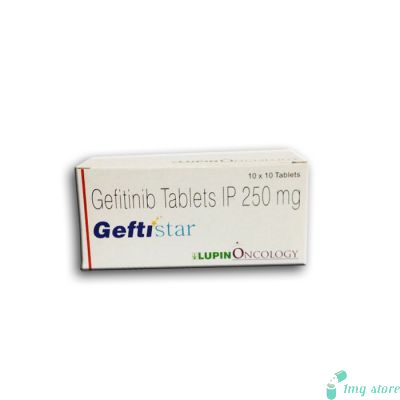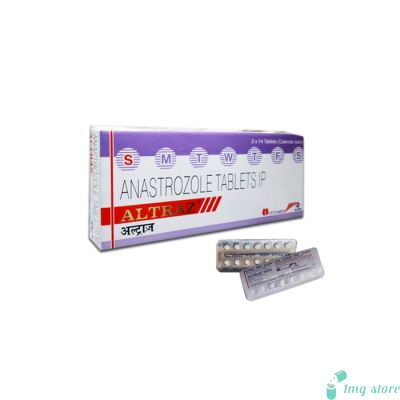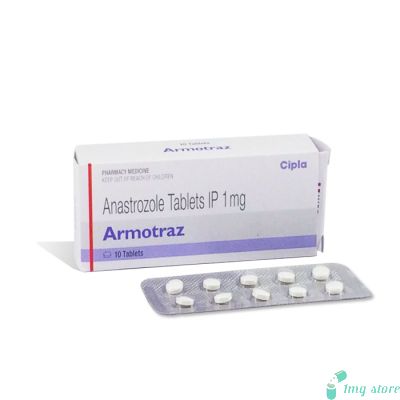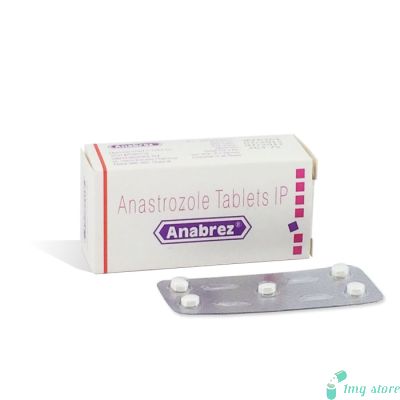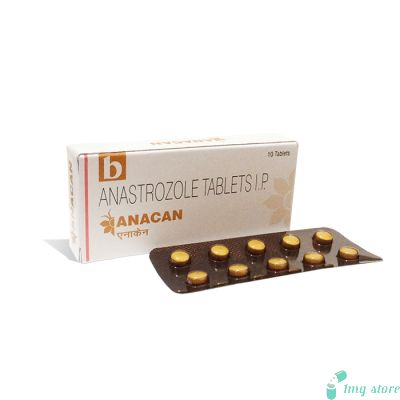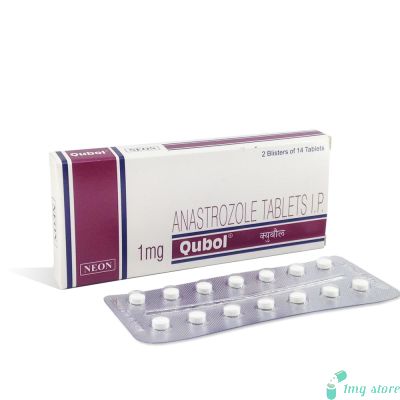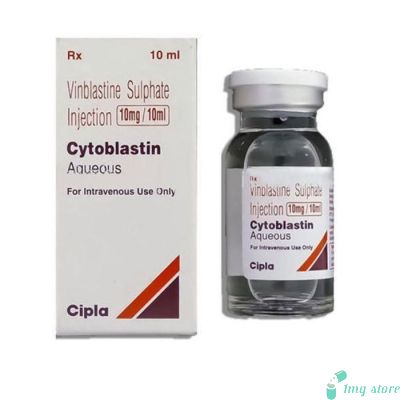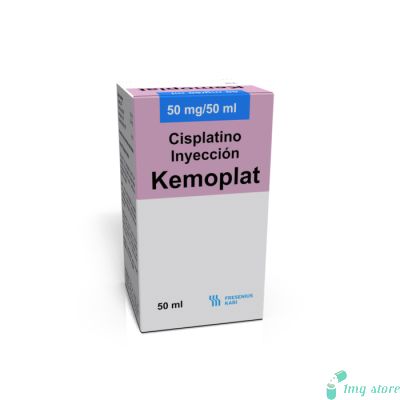Gefticip Tablet (Gefitinib)
Gefitinib Tablet (brand name Gefticip) is a medication used in the treatment of certain types of cancer, particularly non-small cell lung cancer (NSCLC). Iressa is another brand name for Gefitinib.
Information of Gefticip Tablet (Gefitinib)
Gefitinib Tablet (brand name Gefticip) is a medication used in the treatment of certain types of cancer, particularly non-small cell lung cancer (NSCLC). It belongs to a class of drugs known as tyrosine kinase inhibitors (TKIs), which work by inhibiting the activity of specific proteins involved in the growth and spread of cancer cells. Gefitinib is widely recognized under the brand name Iressa and has shown promising results in the management of NSCLC.
Dosage Information:
Gefitinib is available in tablet form, with each tablet containing 250 mg of the active ingredient. The recommended dosage of Gefitinib 250 mg Tablet, for adult patients with NSCLC is 250 mg to be taken orally once daily, preferably at the same time each day. The tablets should be swallowed whole with a glass of water, with or without food. It is important to follow the prescribed dosage and instructions provided by your healthcare professional.
Gefitinib Tablet Price and Availability:
If you are considering Gefitinib Tablet (Gefticip) for cancer treatment, you may explore Gefitinib Tablet Price options at our site, 1mgstore.com. We offer competitive pricing and convenient delivery options to ensure easy access to Gefitinib. However, it is crucial to consult with your healthcare provider before purchasing any medication online or making any changes to your treatment plan.
In conclusion, Gefitinib Tablet (Gefticip) is a targeted therapy medication used in the treatment of non-small cell lung cancer (NSCLC) with specific EGFR mutations. It has shown promising results in improving patient outcomes and reducing tumor size. However, it is essential to follow the prescribed dosage and consult with a healthcare professional to determine the most suitable treatment approach for your specific condition. For more information on Gefitinib Tablet Price and availability, you can visit our site, 1mgstore.com, to explore your options and make an informed decision about your cancer treatment.
Prior to starting Gefitinib Cancer Medicine, it is crucial to take some safety Advice such as:
Before starting Gefitinib Cancer Medicine, it is crucial to inform your healthcare professional about any existing medical conditions, including allergies, liver or kidney problems, lung disease, or any other significant health concerns. This information will help your doctor determine if Gefitinib is suitable for you.
- Inform your healthcare provider about all the medications you are currently taking, including prescription drugs, over-the-counter medications, and herbal supplements. Certain medications may interact with Gefitinib and affect its effectiveness or increase the risk of side effects.
- Gefitinib (Iressa) can potentially harm the developing fetus, so it is essential to inform your doctor if you are pregnant, planning to become pregnant, or breastfeeding. Your healthcare provider will weigh the potential benefits against the risks before deciding whether Gefitinib is safe for you.
- Regular medical check-ups and monitoring of blood tests may be necessary during Gefitinib treatment. Your doctor will assess your response to the medication and make any necessary adjustments to the dosage or treatment plan.
Key Applications of Gefitinib (Gefticip) are:
Gefitinib (Gefticip) is primarily used for the treatment of locally advanced or metastatic NSCLC that has specific mutations in the epidermal growth factor receptor (EGFR) gene. These mutations are often found in patients of Asian descent and are associated with increased responsiveness to Gefitinib Cancer Treatment. Therefore, Gefitinib is particularly effective in patients with EGFR mutation-positive NSCLC.
Gefitinib/Iressa, as an Anti-Cancer, Life-saving Drug, offers significant benefits in the treatment of specific types of lung cancer. However, like all medications, it is essential to understand and manage the potential precautions, drug interactions, and side effects associated with its use to ensure optimal treatment outcomes and patient safety.
Gefitinib may cause various side effects, although not everyone experiences them.
Common side effects include:
Skin-related side effects: Gefitinib/Iressa can cause rashes, dryness, itching, and acne-like eruptions on the skin. It is important to inform your doctor about any skin changes so that appropriate management strategies can be implemented. Taking good care of your skin, using mild moisturizers, and avoiding sun exposure can help alleviate these side effects.
Gastrointestinal side effects: Gefitinib may cause nausea, vomiting, diarrhea, and loss of appetite. It is important to stay hydrated and maintain a balanced diet during treatment. Your doctor may prescribe medications to manage these symptoms effectively.
Respiratory side effects: Gefitinib can cause coughing, shortness of breath, and inflammation of the lungs. If you experience any breathing difficulties, it is crucial to seek immediate medical attention.
Liver toxicity: Gefitinib may affect liver function, leading to increased liver enzymes in blood tests. Regular monitoring of liver function is essential during treatment.
Eye-related side effects: Gefitinib can cause dry eyes, blurred vision, or eye irritation. If you experience any eye-related symptoms, inform your healthcare provider for proper evaluation and management.
Fatigue: Gefitinib treatment may cause fatigue and weakness. It is important to listen to your body and prioritize rest when needed. Engaging in gentle exercises, such as walking, can also help combat fatigue.
Other side effects: Gefitinib may rarely cause headaches, muscle pain, joint pain, changes in taste, or changes in blood sugar levels. If you experience any unusual symptoms, inform your doctor promptly.
Important Quentionaries You may occur while using Gefitinib (Gefticip)
Can Gefitinib (Gefticip) be used for other types of cancer?
Gefitinib is primarily indicated for the treatment of non-small cell lung cancer (NSCLC) with specific EGFR mutations. It is not recommended or approved for other types of cancer. The efficacy and safety of Gefitinib have been extensively studied in NSCLC patients with EGFR mutations, showing positive results in this specific population.
Can I take Gefitinib/Iressa with food?
Gefitinib/Iressa can be taken with or without food. However, it is advisable to follow the instructions provided by your healthcare professional. Some individuals may prefer taking Gefitinib with a meal to minimize gastrointestinal side effects, while others may find it more convenient to take it on an empty stomach. Discuss with your doctor or pharmacist to determine the most suitable administration method for you.
How long will I need to take Gefitinib?
The duration of Gefitinib treatment depends on various factors, including the stage of your cancer, response to treatment, and individual circumstances. In general, Gefitinib is prescribed as a long-term treatment, and it may be continued as long as it is effective and well-tolerated. Your doctor will regularly monitor your condition and assess the need for ongoing treatment adjustments.
Can I drink alcohol while taking Gefitinib?
It is generally advisable to avoid or limit alcohol consumption while undergoing cancer treatment. Alcohol may interact with Gefitinib and potentially increase the risk of side effects or impact the effectiveness of the medication. It is recommended to discuss alcohol consumption with your healthcare provider to ensure the safest and most effective treatment outcome.
Are there any specific tests or precautions I should take while on Gefitinib?
During Gefitinib treatment, your doctor may recommend regular monitoring of liver function, kidney function, and blood counts. These tests help assess the impact of the medication on various organs and ensure your overall well-being. It is important to attend all scheduled medical appointments and communicate any concerning symptoms or side effects to your healthcare provider promptly.
Some Of the key drug interactions with Gefticip Tablet (Gefitinib)
CYP3A4 inducers and inhibitors: Gefitinib is metabolized by the liver enzyme CYP3A4. Drugs that induce or inhibit CYP3A4 can affect the metabolism of Gefitinib. Therefore, it is important to inform your healthcare provider about any medications you are taking that may interact with CYP3A4, such as certain antibiotics, antifungal medications, or anticonvulsants.
Proton pump inhibitors (PPIs): PPIs, commonly used to treat acid reflux and stomach ulcers, may reduce the absorption of Gefitinib. If you are taking a PPI, your doctor may recommend an alternative medication or adjust the timing of administration to minimize any potential interaction.
Warfarin: Gefitinib/Iressa may increase the anticoagulant effects of warfarin, a commonly prescribed blood thinner. Close monitoring of blood clotting parameters is necessary when using these medications together.
Herbal supplements: Some herbal supplements, such as St. John's Wort, may interact with Gefitinib and reduce its effectiveness. It is important to inform your doctor about any herbal supplements you are taking to avoid potential interactions.
| Manufacturer | : | Cipla Pharma, India |
| Equivalent Brand | : | Iressa |
| Generic Search | : | Gefitinib |







